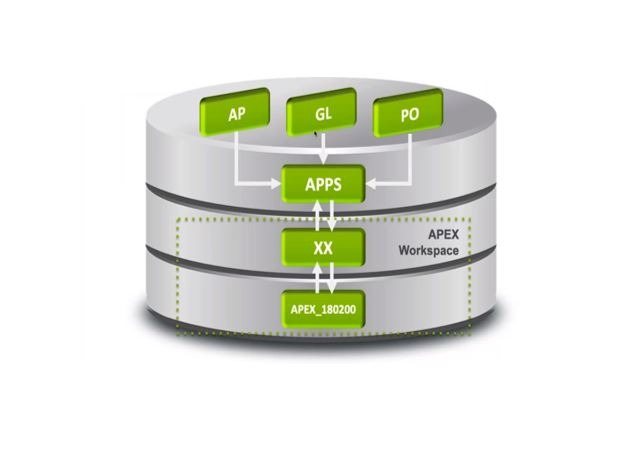In my previous blog, the first of four in this series, I explained how Oracle APEX, Oracle’s Rapid Application Development (RAD) platform allows you to improve the E-Business Suite (EBS) business processes you and your users find inefficient. Because APEX is a RAD platform, it can help you do this very quickly. As it is a fully supported no-cost feature of your licensed Oracle database, it is also a highly economical option.
In this blog, I’ll briefly explain why Oracle APEX integrates so well with EBS.
For starters, APEX is a 100% Oracle product. It is one of the most popular features of the Oracle database, integrated and secure for any scale deployment. This foundation enables applications built with APEX to be enterprise-ready from day one, just like your EBS instance is.
High-Level Architecture
Here’s a simple visual of database schemas showing how APEX and EBS interact. You can see here a model of your EBS instance and an APEX installation.

APEX lives directly in the database, right next to the database component of your EBS instance. This guarantees APEX-built applications are able to take advantage of all the security features and the scalability that your Oracle database offers.
As you can see in the image, the APEX database schemas stand apart from EBS schemas on your database. In accordance with EBS development standards and best practices, it never modifies EBS source code, but rather works with it. In other words, you won’t risk breaking your EBS support with APEX.
Oracle APEX is also independent of the version of EBS you use. Whether you are using anything from 11i to R12.2.x, any updates you may make to your EBS system will have no impact on the APEX engine. As usual, APEX applications or extensions you are creating in the context of EBS need to go through regression testing, which is a practice every mindful organization should execute when applying EBS patches and updates. By the same token, upgrades to Oracle APEX won’t impact your EBS installation. This means reliable, headache-free application performance for years to come.
Here are a few more of the “special ingredients” that enable APEX to integrate so well with E-Business Suite:
A Familiar and Reliable EBS Development Language
EBS developers will find themselves at ease when developing EBS extensions with APEX as they can leverage their SQL and PL/SQL skills to develop applications more quickly and without learning a new language. No need to go through a period of trial and error to get started. Your developers will become more productive, faster.
All of your EBS APIs, views and synonyms can be used just the way you are used to in EBS.
A Low-code Development Environment
APEX provides a development environment where a page or report can quickly be assembled using wizards, adding a high-level of functionality to your applications with limited coding.
For example, with a simple SQL statement like “select * from view where…”, you can generate an online report (called interactive report in APEX) where you empower users to manipulate the results (filters, group bys, highlights, etc.) on the screen without the need to call a concurrent program and wait for the “paper” report to come out. Any APPS synonym or view can used in an APEX application, making sure your data security configuration is maintained.
A better Feedback Loop with Your Users
Not only can applications be quickly created, so can Proof of Concepts (POC). This is one of the great advantages of Oracle APEX. It allows your developers to quickly put together a working version of an application. This way, your users can examine and request adjustments on it before it goes into production. This frees your developers up to take in more user feedback and create more user-friendly applications, resulting in more productivity.
APEX comes with powerful templates that provide intuitive and good-looking layouts for EBS users. What’s more, the templates are highly customizable. I’ll show some examples of those in the next blog in this series.
A Modern Web-Based Tool for EBS Development
Because it is a modern tool, APEX can consume and expose web services. For example, when your EBS system must provide information to other services in your organization, such as supplier or sales order information, this data can be exposed as a web service, replacing Excel or text files, and improving data security and efficiency. Equally, APEX enables you to consume web services either from within your organization or anywhere on the planet. I’ll be talking about the exciting possibilities that APEX and web services bring to EBS in my presentation at Collaborate19, entitled « RESTful Web Services – Break the EBS Jail ». Collaborate19 happens April 7th to 11th 2019 in San Antonio, Texas
Here at Insum we’ve developed a tool that enables APEX to integrate so completely into EBS, it is exactly as if you were in it. The experience is transparent, right up to the colors and the fonts used, as you’ll see in my next blog.
Moreover, the Insum tool also enables APEX to integrate perfectly with the EBS menu and it can recognize data security for operating units and multi-org access, and function security including responsibility exclusions already set up in your EBS system.
A Technical Overview of EBS Development with APEX
Finally, If you or your developers would like to see more technical detail on how APEX can extend a variety of EBS functions, I recommend reading our EBS Extensions Technical Brief
If you’d prefer to talk to us now about how you, your developers, and your users can benefit from our APEX integration solutions, contact us!
Previously in this Series
Extending E-Business Suite to Meet your Needs
[/vc_column_text][/vc_column][/vc_row]


Thanks Sylvain,
I am a support consultant to a telecommunication company in West Africa. Please may I know which version of EBS is compatible with APEX so I can recommend to my company.
Hi Deji,
In fact, the versions of EBS and APEX don’t really matter. APEX is more relevant to the database than it is to a version of EBS. For example, APEX 18.2 requires an Oracle database 11gR2 and later (11.2.0.4 to be exact).
So as long as you have the right database version for the APEX version you are using or want to use, you are all set. After that, you can use APEX with EBS 11i, R12.1 or R12.2 without problems.
Additionally, there are no platform certifications done for APEX. For verifying the platform certification:
Determine if the database is certified on the platform.
Determine if the web server is certified on the platform.
Refer to My Oracle Support document ID 1344948.1 – Application Express (APEX) Database and Web Server Certification Reference. If you have any other questions regarding developing APEX applications in the context of EBS, feel free to contact me.
Hope this helps!
Hi Sylvain, We are running Oracle EBS release R12.2 Financial application at our organization. we do have database version 19c running on database tire. we also checked we have apex 20.2 version installed on our database server. we do run our oracle EBS R12.2 application running on Oracle Weblogic server 11g. Now, Question is that I want to utilize my Oracle Apex and wanted to create one form which we can access from the Oracle EBS application. In this regard, I review some of your videos and documents. Do I need to install ORDS to work this extension on Oracle EBS. Apex Listner/ORDS supports only Java version 8 where EBS 12.2 with weblogic server supports only java 7. so How do I achieve this integration? Thanks in advance for your suggestion.
Thanks & Regards,
Rahul Pandya
Hello Rahul,
You are on the right track and many organizations using EBS R12.1.3 or R12.2.x are doing EBS extensions with APEX.
Specifically for ORDS, you should deploy it on a separate Apache Tomcat or WebLogic Server as you cannot deploy ORDS on the EBS WebLogic server since Oracle doesn’t support such a configuration. You should have a look at this white paper which I co-wrote with David Peake from Oracle for more details on the recommended architecture: https://www.oracle.com/technetwork/developer-tools/apex/learnmore/apex-ebs-extension-white-paper-345780.pdf
Once the technology components in place, we can help you installing a complete EBS-APEX integration with our tool called Handshake for EBS. You would be up and running in a day!
Let me know if you would be interested to fast track your APEX development on EBS.
Sylvain